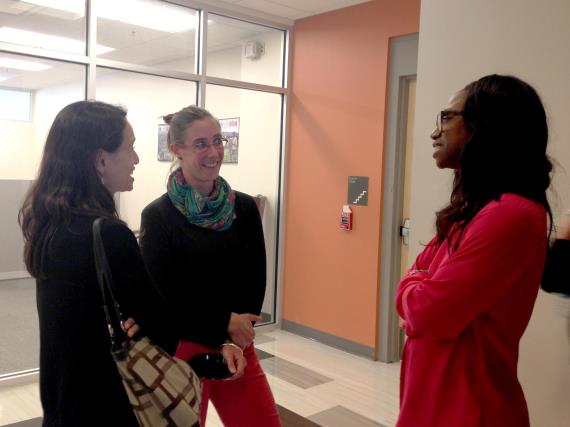Global Public Health Visiting Scholars Explore Novel Methods and Research Processes
 Fogarty Visiting Research Scholar, Adela Tisnés, PhD, (center) from the Collective Health Institute in the National University of Lanús in the province of Buenos Aires, speaks with Drexel School of Public Health faculty members from Epidemiology and Biostatistics, Félice Lê-Scherban, PhD, MPH, and Loni Philip Tabb, PhD, MS.
Fogarty Visiting Research Scholar, Adela Tisnés, PhD, (center) from the Collective Health Institute in the National University of Lanús in the province of Buenos Aires, speaks with Drexel School of Public Health faculty members from Epidemiology and Biostatistics, Félice Lê-Scherban, PhD, MPH, and Loni Philip Tabb, PhD, MS.
May 28, 2015
In the first of a series highlighting our Global Public Health Visiting Scholars, we welcome two scholars who are both focused on learning novel approaches to apply to their respective research - reducing health disparities in communities and disease risk due to occupational health exposure - while they gain a better understanding of the culture of research at academic public health institutions in the United States.
Health problems aren’t the only thing to differ by country. The way research is conducted also varies. The United States publishes more science and engineering articles than any other country, on par with output the entire European Union and all Asian countries.
For two of our current scholars visiting the Drexel School of Public Health from Argentina and Brazil, respectively, the exposure to our research methods and processes will set the stage for their own research to produce advances in knowledge when they return to their home universities this summer.
Adela Tisnés, PhD, who is visiting from the Collective Health Institute in the National University of Lanús in the province of Buenos Aires as a Fogarty Visiting Research Scholar, has embraced the opportunity to apply new approaches and advanced her work on mapping health disparities. Since arriving in April, she’s been using her training in geography and demography in working with Dean Ana Diez Roux on incorporating multilevel analysis into her work, and recently started comparing notes with Loni Philip Tabb, associate professor in Biostatistics and Epidemiology, looking to apply both multilevel analysis and spatial approaches to model contributors to health in a new way.
In Argentina, Tisnés notes, there are different health problems at play. There has been an increase in incidence of death caused by motorcycle or bicycle accidents, for example, potentially stemming from their economic crisis in 2001 which resulted in people opting for less expensive modes of transportation. Linking multiple factors together, like a significant change in the economy, “allows you to see and understand how social and political decisions impact collective health,” she said. When she returns to the Collective Health Institute at the National University of Lanús at the end of May, she hopes to publish her findings on the impact of neighborhood environments on health disparities.
Andres Trotta, MD, Msc, PhD candidate in Epidemiology at the Federal University of Bahia (UFBA) in Brazil, is using his time at Drexel as a Fogarty Visiting Research Scholar to learn about occupational health as it relates to asbestos exposure. He’s also focused on absorbing “the way the production of knowledge is organized,” he said, as he hopes to develop a process of research to design studies, conduct research and publish findings when he finishes his PhD and returns to the Collective Health Institute at the National University of Lanús in his native Argentina.
“In some groups and countries of Latin America, the collective health was born as a manifestation of the crisis of public health, corresponding to a search for social justice and emerging social actors directed towards health problems on the collective level,” notes Trotta.
Trotta’s research discusses the fact that even though Argentina banned on any variety of asbestos fiber, little is known about its use and trade or health effects in Argentina. He’s hoping to spend the remainder of his time at Drexel making connections to researchers focused on occupational health, asbestos, econometrics and time series analysis. By applying different approaches - such as methods used for forecasting in econometric research -, he’s working to estimate prospective mortality and number of cases of mesothelioma deaths.
As we continue to host more Global Visiting Scholars, please stay tuned to learn more about their experiences during their time with us at the Drexel School of Public Health and beyond.